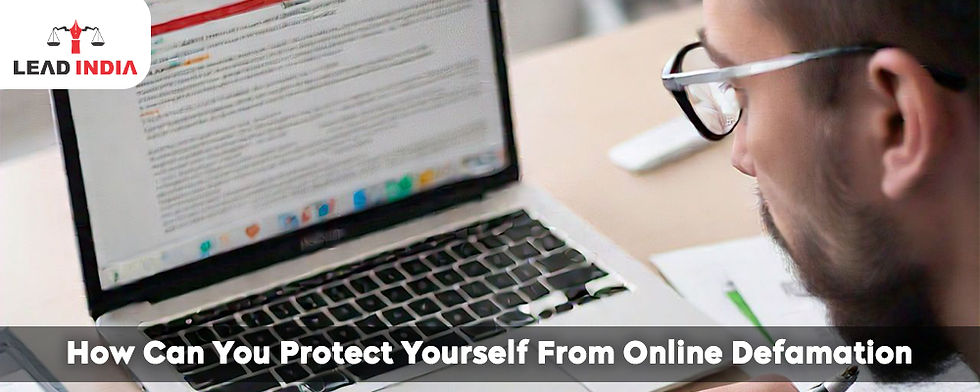How Can You Protect Yourself From Online Defamation
- leadindia400
- Nov 28, 2024
- 4 min read
Online Defamation Is The Act Of Making False Or Negative Claims About Someone On The Internet Or Through Other Digital Communication Channels Such As Social Networking Platforms, Emails, Or Instant Messaging. These Are Written Statements, Hence They Are Classified As Libel. Defamation Is A Worry On Social Media Since Users Can Post And Share Information.
Types Of Defamation
There Are Several Types Of Online Defamation. Let Us Discuss These In Detail:
Slander Involves The Spoken Words. It Is That Type Of Defamation, Which Can Be Done Verbally Through Spoken Words. The Words Defaming In A Live Streaming Podcast Can Be Considered As Slander.
Libel Is The Type Of Defamation Which Involves The Written And Published Words. It Can Be In Form Of Written Posts On Social Media, Blogs,Etc.
Impersonation Occurs When Someone Creates Phoney Online Profiles, Usually On Social Media Or Dating Sites, And Claim To Be Someone Else In Order To Distribute Inaccurate Or Damaging Information About The Person They're Impersonating, Creating Harm And Confusion.
Hate Speech Is Defined As Utilizing Online Platforms To Make Derogatory And Inaccurate Claims About Individuals Or Groups Based On Features Such As Race, Religion, Ethnicity, Gender, Or Other Characteristics That Can Harm A Person’s Reputation.
False Allegation Is Another Sort Of Defamation In Which A Person's Reputation Is Hurt By Making False Charges About Someone On The Internet, Such As Falsely Accusing Them Of A Crime.
Cyberbullying Refers To A Variety Of Online Behaviors Designed To Harass, Intimidate, Or Emotionally Hurt Someone. This Can Include Spreading Unpleasant Or Insulting Remarks About The Victim.
Defamation Laws In India
Section 356 Of Bns Defines Defamation. It Entails Producing Or Publishing False Remarks With The Intent Of Undermining Someone's Reputation In The View Of Others. It Even Includes An Exception For Slander. This Clause Makes Slander A Criminal Crime. It Provides For A Maximum Sentence Of Two Years In Prison, A Fine, Or Community Service.
Section 66 Of The It Act Of 2000 Makes The Act Of Transmitting Offensive Communications By Computer Or Mobile Phone An Offense. It States That If Someone Communicates Defamatory Material To Insult Or Harm Someone Then That Person Will Be Liable.
It Does Not Specifically Talk About Online Defamation. In The Case Of Shreya Singhal V. Uoi In 2015, The Supreme Court Struck Down The Whole Clause. Sections 67 And 67a Of The It Act Talk About The Dissemination Of Pornographic Or Sexually Explicit Material. These Are Indirectly Related To The Offense Of Defamation As These Are Used In Situations Involving Revenge Porn.
How Can You Protect Yourself From Online Defamation
To Protect Yourself From Online Defamation, You Need To Be More Aware Of The Laws And The Ways Of Protection. Let Us Discuss These In Detail:
You Should Monitor Your Online Presence By Regularly Searching Your Name On Search Engines. It Will Help You To Know What Information Is Available Online About You. The Information Available Online Can Be Misused By Fraudsters So It Is Necessary To Protect These Types Of Information.
The Online Accounts On Social Media Platforms And On Bank Applications Should Be Secured By Strong Passwords. You Should Avoid Using The Same Password Everywhere. It Is Advisable To Enable Two-Factor Authentication Wherever Possible To Prevent Unauthorized Access.
You Should Also Avoid Sharing Each Piece Of Information On Social Media. The Privacy Settings Should Be Enabled To Control Who Can See Your Posts, Photos, Etc. This Will Help In Avoiding Sharing The Information With Some Unknown Person Who Can Later Misuse It.
If You Are Receiving Any Defamatory Messages Or Have Seen Any Defamatory Posts, Then Take A Screenshot Of That. It Will Serve As Evidence Of Defamation Later In The Legal Proceedings.
You Should Be Very Sensible In Sharing Any Post On Social Media. You Should Not Share Any Sensitive Information About Yourself.
If You Have Seen Any Defamatory Post Or Received Any Defamatory Statement, Then Report And Block That Website Or That Person.
When Confronted With False Charges Or Unfavorable Comments, Respond Calmly And Professionally. Avoid Starting Online Disputes Or Acting Hostile.
If The Defamatory Content Breaches The Platform's Terms Of Service, Please Contact The Platform To Get It Removed. Many Social Media Platforms And Websites Have Options For Reporting Hazardous Content. Consider Using Online Reputation Management Services Or Solutions To Boost Your Online Image And Reduce Bad Search Results.
You Can Even Consult A Lawyer In Case The Defamation Is Severe. He Can Advise You On Any Potential Legal Recourse. He Can Even Help You In Taking Legal Action Against The Accused.
For Any Legal Help, Contact Lead India. We Offer Free Online Legal Consultations And Other Legal Services. On Our Platform, You Can Talk To Lawyers. You Can Freely Ask Any Legal Question. We Also Provide The Solutions To All Your Legal Problems.
Source:-
Visit Us: — www.leadindia.law
Call Us: +91–8800788535
Email: Care@Leadindia.Law
Facebook: — https://www.facebook.com/leadindialaw
Linkedin: — https://www.linkedin.com/company/76353439
Twitter: — https://twitter.com/leadindialaw
Pinterest: — https://in.pinterest.com/lawleadindia
Instagram: - https://www.instagram.com/leadindialawofficial





Comments